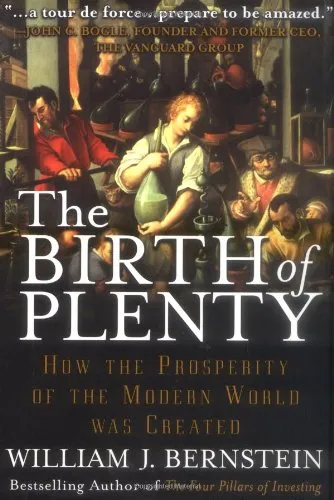The Birth of Plenty : How the Prosperity of the Modern World was Created
4.9
بر اساس نظر کاربران

شما میتونید سوالاتتون در باره کتاب رو از هوش مصنوعیش بعد از ورود بپرسید
هر دانلود یا پرسش از هوش مصنوعی 2 امتیاز لازم دارد، برای بدست آوردن امتیاز رایگان، به صفحه ی راهنمای امتیازات سر بزنید و یک سری کار ارزشمند انجام بدینکتاب های مرتبط:
معرفی مفصل کتاب "The Birth of Plenty : How the Prosperity of the Modern World was Created"
کتاب The Birth of Plenty نوشته ویلیام جی. برنستین، یکی از آثار برجسته در حوزه تاریخ اقتصادی است. این کتاب با نگاهی علمی و تحلیلی به چگونگی ظهور و توسعه رفاه در دنیای مدرن میپردازد. نویسنده به تفصیل توضیح میدهد که چگونه تغییرات کلیدی در جوامع بشری، به ویژه پس از رنسانس، سبب دگرگونی عمیقی در زندگی اقتصادی، اجتماعی و فرهنگی مردم جهان شد.
کتاب در چهارچوبی منسجم نوشته شده و بر اساس مفاهیم کلان تاریخی، اقتصادی و اجتماعی به تحلیل نقش علم، سرمایهگذاری، نهادهای قوی و حقوق مالکیت پرداخته است. به طور کلی، این اثر برای کسانی که به ریشههای شکوفایی مدرن علاقهمند هستند، یک منبع ارزشمند و پرمحتوا تلقی میشود.
خلاصهای جامع از کتاب
در "The Birth of Plenty"، نویسنده این اعتقاد را مطرح میکند که ظهور رفاه و توسعه اقتصادی مدرن به وجود چند عنصر حیاتی گره خورده است: ظهور نهادهای قابل اعتماد، حقوق مالکیت مشخص، پیشرفتهای علمی، و رشد شبکههای انتقال اطلاعات. افول اقتصادهای بسته و جایگزینی آنها با مدلهای بازار آزاد نیز از مباحث کلیدی این اثر است.
پیرو نظریات مطرحشده در کتاب، برنستین بر این باور است که این عناصر اساسی تنها پس از قرن هفدهم میلادی به شکلی پایدار و منسجم در جامعه اروپا ظهور کردند و همین امر سبب تسریع پیشرفتهای صنعتی و مدرن شد. او همچنین به تشریح نقش فرهنگ و هنر در تسهیل این فرایندهای پیچیده پرداخته و تأثیر فناوری و ارتباطات در شکلگیری بازارهای جهانی را به دقت بررسی کرده است.
نکات کلیدی و برداشتها
برخی از نکات کلیدی برجسته کتاب عبارتند از:
- بهبود علم و فناوری به عنوان یکی از پایههای رشد اقتصادی.
- ظهور نهادهای اقتصادی قوی و پایدار که حقوق مالکیت را تضمین میکنند.
- اهمیت اطلاعات در جوامع مدرن و تأثیر مستقیم آن بر بهرهوری اقتصادی.
- ارتباط میان فرهنگ قوی، ارزشهای اجتماعی و رشد پایدار اقتصادی.
کتاب به روشنی نشان میدهد که چرا نبود چنین عناصر کلیدی در بسیاری از جوامع در عصرهای مختلف، مانع از پیشرفت اقتصادی آنها شده است.
جملات معروف از کتاب
"Economic growth requires not just resources and population, but more importantly institutions and innovations."
"Freedom, innovation, and growth thrive only in societies that protect the rules of law and contract."
چرا این کتاب اهمیت دارد؟
"The Birth of Plenty" فراتر از یک کتاب تاریخ اقتصادی است. این اثر دریچهای تازه به درک ما از علل و عوامل پیشرفت پایدار جوامع بشری میگشاید. برنستین با استفاده از شواهد تاریخی، تجربیات مدرن، و تحلیل جامع، به خوبی نشان میدهد که چه عواملی موجب ایجاد شکاف میان جوامع موفق و جوامع عقبمانده شده است. برای دانشجویان اقتصاد، تاریخ، و حتی علاقهمندان به جامعهشناسی، این کتاب به عنوان راهنمایی جامع و الهامبخش تلقی میشود.
علاوه بر این، این اثر به ما یادآوری میکند که رفاه و توسعه پایدار نه تنها به منابع طبیعی، بلکه به سیستمهای اجتماعی و اقتصادی قدرتمند و ارزشهایی چون اعتماد و شفافیت بستگی دارد.
در نهایت، "The Birth of Plenty" به سوالی پاسخ میدهد که بسیاری از افراد در طول تاریخ پرسیدهاند: چگونه برخی جوامع به شکوفایی رسیدند؟ و چگونه ما میتوانیم از دانش آنها برای آیندهای بهتر بهره ببریم؟
Introduction
Welcome to an exploration of the forces that have shaped the wealth and prosperity of the modern world. "The Birth of Plenty: How the Prosperity of the Modern World was Created" by William J. Bernstein is a groundbreaking work that delves into the mechanisms and prerequisites responsible for the rapid economic growth and unprecedented standards of living that humanity has achieved since the early 19th century. This book provides a comprehensive analysis of history, economics, and the critical societal elements that have driven the dynamics of wealth creation. It tells the story of how innovation, governance, financial systems, and intellectual progress came together to create an era of prosperity.
Bernstein argues that prosperity is not an accident or the result of geographic luck but a deliberate outcome of certain essential conditions coming into alignment. By examining the great turning points in history as well as why some nations progressed while others faltered, the book paints a clear picture of how modern affluence emerged and why understanding its foundations is crucial for sustaining it in future generations.
Detailed Summary of the Book
The core thesis of "The Birth of Plenty" revolves around four essential conditions that sparked the rapid economic and social progress seen since the early 19th century. These "pillars of prosperity" are:
- Property Rights: Stable and enforceable property rights are critical for fostering innovation and protecting individual and corporate investments.
- Scientific Rationalism: Scientific inquiry and the pursuit of knowledge allowed humanity to transcend superstition and systematically harness nature's forces.
- Capital Markets: The ability to pool and allocate resources effectively through well-functioning financial systems unlocked massive long-term investments in infrastructure, business, and technology.
- Efficient Transportation and Communication: The development of infrastructure helped connect markets, people, and ideas, accelerating the exchange of goods and innovation.
Through these pillars, Bernstein examines how the Industrial Revolution marked an inflection point in global development. He contrasts this period with earlier eras when similar conditions were absent, explaining why the Middle Ages or Ancient Rome failed to generate sustained prosperity on a comparable scale. Furthermore, the book explores the uneven distribution of these forces, analyzing why some nations advanced rapidly while others stagnated or fell behind.
In addition to looking backward, Bernstein extends his analysis into the future, posing critical questions about the sustainability of prosperity in the modern age and the threats, such as mismanagement of resources, political instability, or neglect of the essential pillars, that could derail continued progress.
Key Takeaways
- Economic growth and societal innovation do not happen by chance—they require specific enabling factors.
- The alignment of property rights, financial systems, scientific progress, and shared knowledge creates a fertile ground for prosperity.
- Historically, nations that failed to establish these conditions have seen stagnation or decline in growth.
- Understanding the foundations of prosperity is vital for sustaining it in the long term and addressing global disparities.
- While technological advancements continue to accelerate progress, they are not a substitute for stable governance and equitable institutions.
Famous Quotes from the Book
"History teaches us that without property rights, no society can prosper."
"Scientific rationalism is not just the basis of technological progress; it also represents a worldview that promotes curiosity and objective thinking."
"Capital markets do not merely provide wealth; they serve as the engine of progress by channeling resources to their highest uses."
"The infrastructure of communication and transportation is the backbone upon which commerce and cultural progress rely."
Why This Book Matters
"The Birth of Plenty" is not just a history book; it is a roadmap for understanding the economic and social progress that underpins much of the modern world. In a time when globalization, technology, and political disruption are shaping societies at an unprecedented pace, this book provides essential insights into what fosters lasting prosperity and what risks undermining it.
Bernstein’s focus on the interplay of governance, innovation, and economic systems makes this book an invaluable resource for policymakers, business leaders, academics, and anyone interested in the forces driving the modern world. Its lessons are timeless, offering both an explanation of the past and a guide to ensuring a prosperous future. The book matters because it highlights that progress is not inevitable—it depends on deliberate choices about enabling the right institutions and nurturing the critical pillars of growth.
دانلود رایگان مستقیم
شما میتونید سوالاتتون در باره کتاب رو از هوش مصنوعیش بعد از ورود بپرسید
دسترسی به کتابها از طریق پلتفرمهای قانونی و کتابخانههای عمومی نه تنها از حقوق نویسندگان و ناشران حمایت میکند، بلکه به پایداری فرهنگ کتابخوانی نیز کمک میرساند. پیش از دانلود، لحظهای به بررسی این گزینهها فکر کنید.
این کتاب رو در پلتفرم های دیگه ببینید
WorldCat به شما کمک میکنه تا کتاب ها رو در کتابخانه های سراسر دنیا پیدا کنید
امتیازها، نظرات تخصصی و صحبت ها درباره کتاب را در Goodreads ببینید
کتابهای کمیاب یا دست دوم را در AbeBooks پیدا کنید و بخرید
1264
بازدید4.9
امتیاز0
نظر98%
رضایتنظرات:
4.9
بر اساس 0 نظر کاربران
Questions & Answers
Ask questions about this book or help others by answering
No questions yet. Be the first to ask!






![The Ultimate iOS Interview Playbook: Conquer Swift, frameworks, design patterns, and app architecture [Team-IRA]](https://s3.refhub.ir/images/thumb/The_Ultimate_iOS_Interview_Playbook__Conquer__29925.webp)







